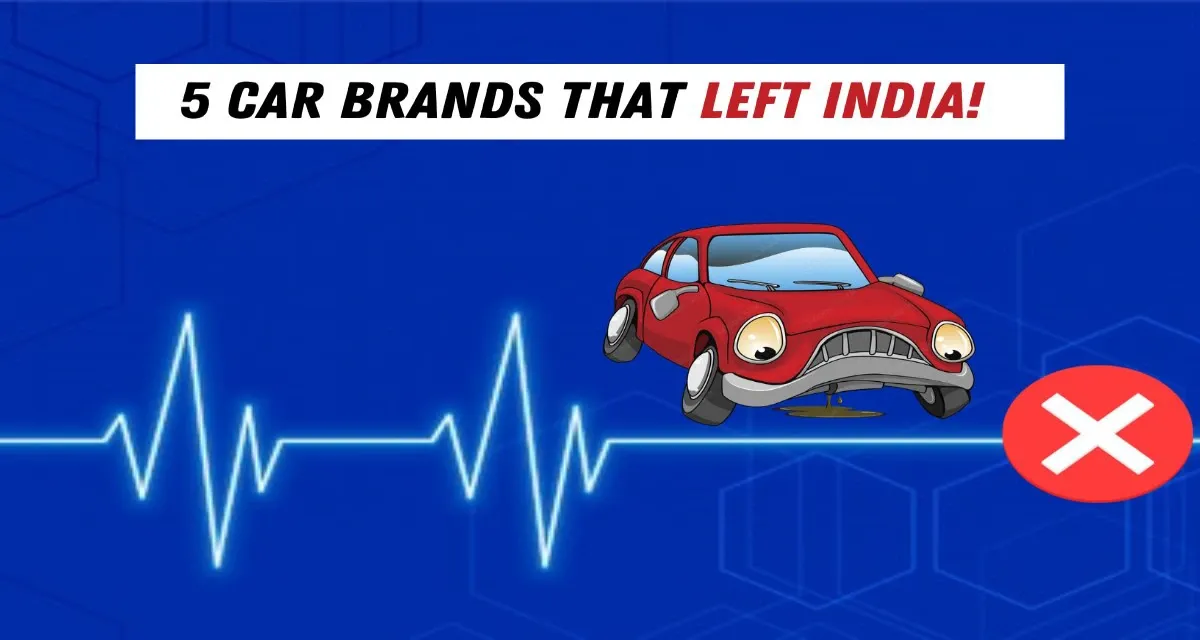

India has been one of the largest automotive markets in the world, rather a lucrative one. Companies like Tesla even try hard to enter such a busy market but few brands have bid farewell. India is currently the world's fourth-largest automobile market, home to over thirty different car brands. In contrast, there have also been brands that, for various reasons, were unable to continue existing. We are going to talk about five car brands that departed India in today's article.
Once an important player in the Indian auto industry, General Motors produced several well-known vehicles in Pune and Gujarat, including the Tavera, Cruze, Optra, Enjoy, and more. General Motors had difficulties when it first began operating in India two decades ago with names like Opel and Chevrolet. Opel left early, but Chevrolet's vehicles helped it become more well-known. Chevrolet eventually had to leave the Indian market due to heightened competition and diminishing sales. It was a surprise when this venerable American brand decided to retire.
This brand of cars especially like Lancer had a different craze. This Japanese carmaker Mitsubishi previously controlled the Indian market with well-known models like the Pajero and Lancer. When the Lancer was introduced in 1998, there was a stir since Mitsubishi had teamed up with Hindustan Motors to make automobiles there. This collaboration was essential because Hindustan Motors gave Mitsubishi the infrastructure and support it needed to operate in India.
However, when Hindustan Motors ultimately decided to close its doors, the tale took an unexpected turn. Mitsubishi suffered a great deal as a result of this incident since it left the Japanese company without a robust after-sales support system and a consistent source of replacement parts. After finding it difficult to navigate these obstacles, Mitsubishi ultimately decided to cease its operations in India.
Mitsubishi's presence in India hasn't completely disappeared despite this setback. The Outlander SUV and the Pajero Sport Select Plus are still featured on the company's official website, suggesting that the firm is still closely monitoring the Indian market. Customers may even reserve the Outlander on the website, indicating that Mitsubishi is still interested in the nation.
Also Read: Check out the car collection of Sunrisers Hyderabad's CEO Kavya Maran
Nissan, the parent company of Datsun, had to terminate the brand of affordable cars after it failed to gain traction in India. Its lack of appealing features and poor construction quality were the primary causes of its collapse. Despite having affordable vehicles such as the Redi-GO, GO, and GO+, Datsun was unable to compete and lost customers.
2019 saw the closure of Fiat, a well-known automaker in India, due to low sales and excessive expenses. Even though it would have cost them money, they chose not to modify their well-liked 1.3-liter Multijet diesel engines to comply with new pollution regulations. Maruti discontinued using Fiat engines in their vehicles as a result of this. Fiat was ultimately forced to exit the market since they sold very few Punto & Linea vehicles—roughly 100 total. Leaving an old buddy who couldn't adapt to the changing times was like bidding farewell to an old friend.
Ford made the strategic decision to leave the Indian market as a result of years of losses that mounted and their inability to establish a significant presence in the fiercely competitive car industry.
Ford found it difficult to duplicate its success in India, even after introducing well-known models such as the Escort, Ikon, and Endeavour. The Figo and Aspire, two of their later releases, did not meet the same level of demand as their previous successes. Taxes and prices were two of the main concerns. Ford's automatic models were substantially more costly than their manual equivalents, which put them at a competitive disadvantage. The automatic variants' reduced competitiveness was further exacerbated by the fact that their larger engines came with greater taxes.
With local companies like Maruti Suzuki and Tata Motors up against fierce competition from the likes of Suzuki, Hyundai, and the more recent newcomers Kia and MG, the Indian auto market has turned into a battlefield for international competitors. Ford was merely unable to adapt to the rapid rate of change and the evolving needs of its customers. In the end, Ford had to make the difficult but vital decision to leave India because the business was having trouble turning a profit in the face of growing losses and a crowded market. The decision is the most recent in a string of well-known American automakers' withdrawals from the Indian market, a reflection of the difficulties presented by this dynamic and intensely competitive environment.
Also Read: